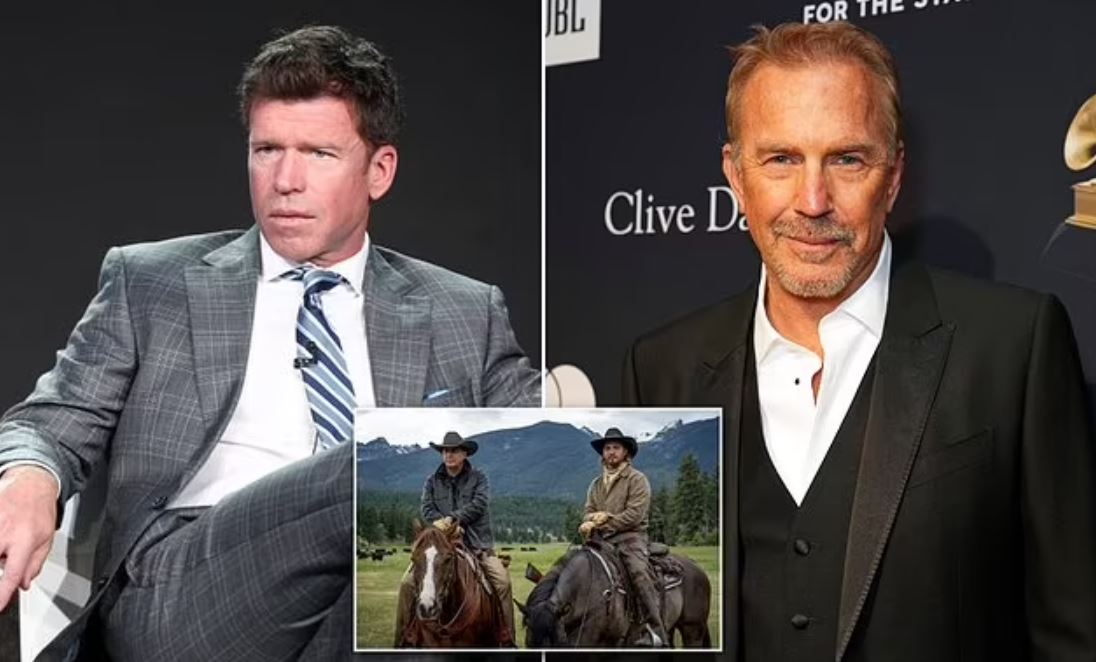SPOILER ALERT: This post contains spoilers from Season 5, Episode 14 of “Yellowstone,” “Life Is a Promise,” which premiered Sunday, Dec. 15 on Paramount Network.
It’s been a long, dusty and bloody road for the Dutton family over the past five seasons of the massively popular Western series “Yellowstone.” As the season came to a close (before a Beth and Rip spinoff launches), viewers experienced some shocking deaths over the final few episodes — including one committed by a horse. But amid the bloodshed, there was also a sense of closure for this chaotic and influential Montana family. “Yellowstone” executive producer Christina Alexandra Voros unpacked the eventful final episode for Variety.
Do you know what the original ending would be if Kevin Costner had stayed on?
I never had a specific conversation with [creator] Taylor Sheridan about where this was going to end prior to Kevin’s departure. I do know that members of the cast have talked about conversations they had with him early on — you know, Season 1 — where they got the sense that he has always known that the ultimate ending has to be the loss of the patriarch and passing on the legacy. But that information is almost secondhand for me. I do know that it changed the “how” if not the “what,” but I wouldn’t be able to talk specifically about what that differential was.
I think the limitations that were put on Taylor with Kevin’s departure really brought out a side of his writing that I know people have mixed feelings about: The flashbacks and the way that the season was structured overall. I actually thought it brought out a different layer, the way that he puzzled through how to tell this story with the absence of the person that you’re telling the story about. I thought it made for some really interesting creative choices. Sometimes limitations can be the best friend of good art because it forces you to think creatively about things in a way that is not as straightforward as you might have originally planned.
We really get to know Travis this season, and seeing Taylor play a cocky playboy was a fun gear. What would you say is the biggest way that Taylor is like Travis in real life, and the biggest way he’s different?

Taylor is a brilliant writer and a brilliant director, but I feel like I have learned more from him as a general and as a businessman, or as much as I have from him in that capacity as I have from him as an artist. You look at the journey that he has made since “Yellowstone” began, when he was a first time director of a TV series that got Kevin Costner to play the lead, to having seven shows spinning at one time and being one of the most talked about names in television. That comes from his tremendous skill as a storyteller, and his brilliance as a writer. It comes from his ability to change the rules of the game. Show me someone 20 years ago who could be living in Texas and running half a dozen TV series from the place that he wants to be living in because he hates L.A. and he’s chosen a life that allows him to be prolific, but also on his own terms.
I think you see that in Travis. I think he is a tremendous salesman. I think he likes beating the system, enjoys being able to flip the script literally and figuratively. I also think that if you ask him about it, this was a very depressing season of television. Bringing Travis in allowed for a little bit of comic relief in a season that you didn’t get much of that. That’s always been part of “Yellowstone.” Terrible things happen, you lose people, but then there’s a funny scene in the bunkhouse, or there’s a great country musician that people don’t know about who gets discovered in this cameo. That’s always been part of the DNA of the show. So I think people were so wrapped up in the tragedy of this final season that some folks forgot that there’s always been an element of comedy in this. It’s always been present, and he just cast himself as the element that brought some of that levity because everyone else was so absolutely devastated about the loss of John Dutton. It would be hard to find the comedy from Beth and Rip and Kayce. I thought it was a pretty bold move on his part, but I think it served the story.
What was the process of choreographing the episode’s major fight between Jamie and Beth?
It’s all hands on deck. We’ve been very lucky with the the stunt coordinators that have been with us on this show from the beginning — Jason Rodriguez, Jordan Warrack and, back when we first started, Wade Allen — are are some of the best in the business. One of the things I love as a filmmaker is that the cast is so gung ho and committed that they want to do as much of it as they can possibly do, so they are getting it in their DNA. Obviously there are places where you will put in their doubles, who have also been with us from the beginning. They’ve learned the way the actors move and have been studying that so you do have that element for places where you want to pull the pad out and someone has to hit the ground and Kelly has 12 more days of shooting and nothing can happen to her. But Kelly and Wes did the majority of that fight themselves, and even if they are not taking a punch or throwing one, the energy it takes to keep in that space emotionally is exhausting. So I think what people don’t realize when they see that fight is yes, it looks real and bloody and gruesome, but just staying in that mindset of being this ferocious takes a great deal from the actors to stay in the headspace. Forget about the milk and the bear spray and the stabbing and all that. That’s the easy part. My kudos to Kelly and Wes for being able to keep in that extreme state of war emotionally throughout that scene.
Luke Grimes said in a recent interview with Esquire that, for this chunk of the season, “there was a part of Kevin being gone that meant some of the conflict was gone.” Do you agree with him on that assessment from your vantage?
I didn’t see the quote that some of the conflict was gone. Someone sent me him saying it was the easiest season of filming that we’d had, and I think that comes from many sources. I think that it was the seventh year of making a story with a lot of the same crew that started making it from the beginning. I think that there was something really gorgeous that happened of life imitating art imitating life, where you take the patriarch away and everyone else has to fill that space on the stage and being held responsible to carry that dramatic weight on the show. I actually think it’s a really beautiful thing for an actor, and I felt like the cast this season really stepped in to fill that space. That kind of work is energizing and it gives a new meaning to perhaps playing the same roles that you’ve been playing every year, because it’s all on your shoulder.

Ironically, the purpose that is felt by the characters who have to figure out how to move forward was also felt by the cast, who had to figure out how to move forward without someone who’d been shouldering a lot of the storyline in all the seasons past. It felt like everyone had this new energy moving in, and the fact that we knew it was the last season … everyone knew how special what we were doing was and how much we loved each other as a creative family. So there was just a real sense of inspiration. No season of Yellowstone is easy for anyone: You’re up against time and money and elements and weather and all of it. But this season felt inspired and really enjoyable to be making from start to finish and I think it’s I think it is because everyone realized that it was our last chance to get to do this together and every day was precious.
Right before the finale, we learned that the Beth and Rip spinoff was moving forward. Have you been involved with any of the discussions about the show at this point?
No, it’s too early to tell. I would be a fool to try to guess or bet on how Taylor is alchemizing these stories in his brain. What I will say is one of the things I’ve always been blown away by about him as a writer is he writes like something is passing through him. When we did “1883,” I got a script on a Tuesday and, by the following Tuesday, there were three more scripts and it just sort of came like a force. When he has a story in his mind it comes out very quickly and comes from a place that’s mysterious to me. So I don’t know what the next story is for him, I just hope I get to be there when he puts it on the page.
You’ve mentioned that you like to keep an eye on what fans are talking about during the season. Were there any things you were surprised to read or misconceptions you’d like to address or set the record straight on?
It’s funny that it’s been such a cross-section. There are the people who can’t stand anything, and I think you know when you are coming to an end of the story, it’s just part of human experience. It changes the lens through which you’re looking at. I mean, it happens in relationships. If you were told this is the last person you are ever going to get to date in your life, you might be a little choosier. So I think people have fallen in love and not had to think about it ending for six seasons and then, all of a sudden, you know that it’s ending and the stakes are high.
People have their ideas of how they wanted it to end because they feel a level of ownership in the storytelling, since they’ve been following the story for so long. So I have seen the full range of praise and snark, and people arguing every angle of the political spectrum from super-conservative red state values to wokeness. What’s interesting to me is that it is summoning all of these different, conflicting ideas of what this season is and everyone’s watching the same season. I think ultimately that is the purpose of art and that is the purpose of narrative: Storytelling is to provoke these conversations. I think the fact that the reaction has run the gamut is a sign that we’ve been doing something right.
